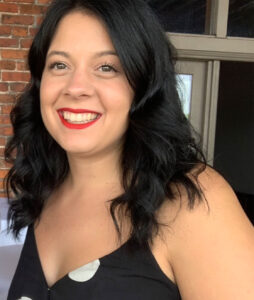 For Amanda Kauffman, a student in the UW-Milwaukee Bachelor of Science in Biomedical Health Sciences: offered through UW Flexible Option, learning online was not only convenient—it was necessary. After a few semesters at schools in Milwaukee, Chicago, and at a community college, she wasn’t thriving in her pursuit of a bachelor’s degree, in large part due to hearing loss in one of her ears.
For Amanda Kauffman, a student in the UW-Milwaukee Bachelor of Science in Biomedical Health Sciences: offered through UW Flexible Option, learning online was not only convenient—it was necessary. After a few semesters at schools in Milwaukee, Chicago, and at a community college, she wasn’t thriving in her pursuit of a bachelor’s degree, in large part due to hearing loss in one of her ears.
“It was very troublesome for me, being in the classroom setting,” she says. “I would do my accommodations. I would sit up front. I talked to my teachers; did office hours. My grades were constantly affected by it.”
With UW Flexible Option, all of the coursework, including syllabi and learning materials, is available online and can be completed at a student’s own pace. This is a huge benefit for students like Amanda who would normally need accommodations in a traditional classroom setting. The UW Flexible Option program offered her an experience she says changed her life.
“I think it was my saving grace. I think the fact that [learning in-person] even with accommodations was so difficult for me because you’re dealing with different professors, personalities, even just talking levels. Only so much can be accommodated for you. So here, I love that it’s just all up front. You have all the information in your syllabus. Everything is very detailed.”
In addition to a flexible learning environment, Amanda says her professors have been great, especially in responding to her questions. Some have even walked her through coursework over the phone.
“I think this program was so helpful for me just because, like I said, everything is there. As long as you’re disciplined and you can space it out and how you need to complete your assignments, there’s no way you can say that you didn’t understand something or that you didn’t have all the information.
“And that was my problem before: A lecture, for example. You’re in person. You can take so many notes for so long. But what if you don’t hear something? What if you misinterpret something? And then you don’t understand that lesson plan. But here, there’s videos of lectures. I can go back and just rewatch this lecture and not be like, oh, I misunderstood this or anything like that.”
In high school, Amanda wore a hearing aid with an FM system that amplified sound and eliminated some background noise. “It’s not perfect,” she said. “There were still some issues with that.”
After that, she got a cochlear implant, but the background noise present in a typical college classroom or lecture hall made it tough to concentrate, even if she was seated up front. Amanda also reads lips, but if the instructors were moving around too much, she couldn’t focus on their faces. Despite the accommodations her universities and colleges offered, Amanda wasn’t completely comfortable with the face-to-face learning environment.
With UW Flexible Option, she can study at home. “It’s so much easier for me to learn and educate myself further. It’s so much easier to focus because I can get easily distracted just from all the noise and amplifications that go on in my background.”
Amanda works full-time as an analyst at Medline Industries, where she manages four accounts (four hospitals) in the Texas region and handles inventory and pricing.
“Before that, I used to work in their surgery department as an account manager. I got to learn a lot about medical coding, medical products, sterilization, all that fun stuff. But I’m hoping to become more upper-management level. I like the idea of going back toward surgery and working as an account manager over there. Getting my degree will help me with that. I’d love to be almost a director of something within a medical supply company because I love the company I work for.”
Amanda’s typical day involves working at Medline remotely from 7 a.m. to 4 p.m. She’s also really into fitness, and often goes to gym classes after work. Afterward, she grabs dinner and starts her homework around 6 p.m. She often studies until midnight, but is a night owl. However, she’s able to work on schoolwork during the day as well when she has some downtime.
“It’s been a really great program to go along with working full-time,” she said. “Medline has given me tuition reimbursement as well. They’re super understanding and super happy to support my education and my studies.”
During her time in the Biomedical Health Sciences bachelor’s degree program, Amanda has completed coursework that focused on people with disabilities and inclusive language, which was important to her.
“It was really interesting because as somebody who also has a disability, learning people-first language was super important. And sometimes even myself, I feel like I use that kind of language. But when you think about other people and their disabilities, using the wrong terms and not even knowing it…I feel like it was just a nice realization for me to be like, hey, before you speak, make sure you are using the appropriate language. That class gave me a nice refresher.”
She also benefited from the Client Diversity in Health Sciences course. “My company is huge on diversity. And there’s a lot of training and implementations that they do for that, which is awesome.” However, the course also addressed unconscious biases and offered ways to implement the concepts personally and professionally. “Make sure you’re not being ignorant to a situation,” she said.
One of the things Amanda likes about her professors is that the department is very close-knit, meaning, she’s not thrown for a loop when she gets into a new course. She knows generally what to expect. “It makes learning a lot easier and communicating a lot easier. So that is one thing I like about this program so far, is that I’ve had a lot of the same teachers just teaching different ways. But I love them.”
Amanda, who found the UW Flexible Option program via Google, was amazed at the fast response she received from the enrollment advisers when she applied last October. The application and enrollment process took less than two weeks. UW Flexible Option programs are offered in subscription periods that begin every month, which allowed her to start sooner rather than waiting for the next semester to begin before she could start. The longest part was waiting on transcripts from her prior institutions.
“[My enrollment advisers] were always giving me updates, which was great because sometimes I feel like you get left in the dark a little bit during those processes. I hate being left in the dark or having things trail along for a long time. And because I wanted to start so soon, I was worried that it was going to conflict, and I’d get pushed back maybe a month or so. But that didn’t happen. It worked out well.”
From start to finish, the UW Flexible Option program offers support that a traditional educational environment may not.
“I really think people who struggle in a classroom setting should really consider a program like this. Like I’ve told my other professors, this was life-changing for me. I’m going to be the first kid in my immediate family who is getting their degree. And I’ve been trying so hard for years to get it. But it just never worked. Now that I found this, I can literally taste it. I graduate this December. I’m super excited.”
For more information about Biomedical Health Sciences and how it can help your career, contact an enrollment adviser.

